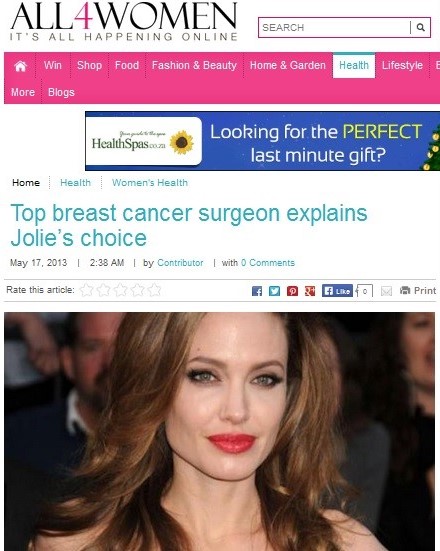Hollywood actress Angelina Jolie made headlines when she disclosed her genetic risk of breast cancer and her choice to have a bilateral mastectomy with immediate reconstruction.
The illusion of her picture perfect life was shattered and for many women it raised the question, ‘Should I be tested?’
“The most common genes, of which a defect will give rise to breast cancer, are BRCA 1 and 2. The risk Jolie was facing was to develop breast cancer due to a disease-causing mutation in the breast cancer gene 1 (BRCA 1) which she carries. The breast cancers linked to BRCA 1 are generally very aggressive cancers and treatment is not very successful,” explains Professor Justus Apffelstaedt, President of the Breast Interest Group of Southern Africa.
He adds that even if the patient survives this aggressive form of breast cancer, women carrying the mutated BRCA gene are also still at a high risk of developing ovarian cancer.
“Testing for BRCA 1 and 2 mutations is available in South Africa at specialised centres. Counselling before testing is offered in these centres and I cannot stress enough the importance of this,” says Apffelstaedt, who is also the Head of Tygerberg’s Breast Clinic.
As gene defects have very serious implications for affected families, testing should not be done without prior counselling. If a genetic defect related to cancer is diagnosed, the specialised centre will offer advice on how best to manage the risk of cancer.
Options include surveillance, an annual examination to diagnose cancer early or active surgical risk reduction, as in the case with Jolie. Here the options are bilateral skin-nipple-areolasparing mastectomy and immediate reconstruction, removal of the ovaries, or both.
It is important to know, that defects in the BRCA genes can be transmitted to children, both girls and boys. Likewise, a BRCA defect can be inherited from the mother as well as the father.
In males, BRCA defects also cause cancers but the pattern of cancers is less well-defined than it is in women. While women suffer from breast and ovarian cancers, men could develop cancers such as prostate, colon, blood, pancreatic, breast and certain types of skin cancers.
Link to article: http://all4women.co.za/health-and-wellness/womens-health/top-breast-cancer-surgeon-explains-jolies-choice.html





